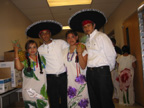
| Lane Home Page | Search Lane |
| Website Accessibility |
|
FC Links: >> Invitation to Faculty Connections >> Faculty Professional Development |
Faculty Connections History
The next Coordinator, Dennis Gilbert, a physicist, borrowed from his discipline’s discourse for the Faculty Connections poster: “As the number of faculty colleagues increases linearly, the number of possible links among us grows geometrically. Thus, much of the capacity and vitality of the faculty comes from connection among colleagues.” The current coordinator is Liz Coleman, who also coordinates Tutoring Services and teaches College Success and Effective Learning classes. My goal is to help us help each other to engage our collective student body. Many other aspects of Faculty Connections model the inclusivity that is part of a lively faculty culture. |
Chartered in 1998 by the Strategic Learning Initiative (and a result of a recommendation of the 1995 Future Faculty Task Force Report *(.pdf), Faculty Connections is now part of the college's faculty professional development budget. Its goals are twofold:
- to welcome and integrate people into the faculty and college communities in a clearly positive way without hiding some of our challenges
- to make connections between new faculty and established Lane faculty and other staff
Pineapple Dancers at the 2005 Rites of Passage Graduation. Click on the thumbnail to see enlarged photo |
Faculty who choose to can define a formal mentor/partner relationship that lasts one year. The partnership may be between the two people who were paired for the September in-service or it may be with someone else.
Faculty Connections activities start with a two-day program of useful and engaging activities in mid September. This exemplary faculty-led program supports integration of new colleagues into the faculty and college. By “new” colleagues we mean:
- Colleagues new to either permanent or adjunct positions; and participation for several years while “new” is encouraged
- Permanent colleagues during their time on probation
- Relatively new adjunct colleagues who want a broader view of and more integration into faculty life at the college.
If you are such a person, Faculty Connections will connect you with experienced colleagues who want, through mentoring activities, to help new colleagues become more integrated into the whole faculty.
For several years, relatively few full-time positions have been filled, so we now take the opportunity to deal more fully with integrating part-time faculty colleagues into the whole faculty, which is of interest to both full- and part-time colleagues.
More recently, in addition to the fall program, Faculty Connections participants are invited to social events and Round Table discussions, to join with colleagues to experience and discuss important aspects of college and faculty life.
Besides the satisfaction of being part of creating connection among colleagues, a small stipend is available for participants in the fall program, and participants in Round Table discussions will receive materials. Costs for some cultural events and socializing along with partners/family are covered by Faculty Connections.
>> Return to Lane's Home Page >> Return to FC Main Page >> Return to top of page Lane Community College - Faculty Connections 4000 East 30th Ave, Eugene, OR 97405 - (541) 463-5049 Please direct comments about these pages to colemanl@lanecc.edu Revised 9/1/11 (llb) © 1996-present Lane Community College |
 Native to the Western Hemisphere, Indians in what are now Brazil and Paraguay used pineapples in feasts and rites related to tribal affirmation. A pineapple is considered by many to be a symbol of hospitality and welcome. Beth Naylor, first Faculty Connections Coordinator who taught nutrition courses in the Family and Health Careers Division, brought food symbols to Faculty Connections.
Native to the Western Hemisphere, Indians in what are now Brazil and Paraguay used pineapples in feasts and rites related to tribal affirmation. A pineapple is considered by many to be a symbol of hospitality and welcome. Beth Naylor, first Faculty Connections Coordinator who taught nutrition courses in the Family and Health Careers Division, brought food symbols to Faculty Connections. 
